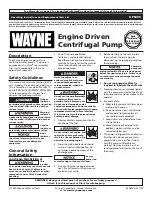
Troubleshooting and fault elimination
Fault analysis
Fault analysis with the history buffer
130
EDBCSXE040 EN 6.0
10.1.3
Fault analysis with the history buffer
The history buffer (C0168) enables you to trace faults. The corresponding fault messages
are stored in eight memory locations in the sequence of their occurrence.
Structure of the history buffer
ƒ
The fields under "fault history" show the memory locations 2 ... 7.
ƒ
The fields under "current faults" indicate memory location 1. It gives information on
the active fault.
ƒ
If the fault is no longer active or has been reset,
– all information in the fault memory will be automatically shifted upwards by one
subcode.
– memory location 1 will be deleted (no active fault). The information on the
formerly active fault is now in subcode 2.
– the contents of subcode 8 will be eliminated from the history buffer and cannot be
read any longer.
ƒ
The history buffer contains three information units for every fault occurred:
– Fault number and response
– Time of the last occurrence
– Frequency of successive occurrence
Note!
ƒ
If several faults with different responses occur at the same time, only the
fault the response of which has the highest priority is entered in the history
buffer.
– Power supply module ECSxE:
TRIP/KSB−TRIP (highest)
→
message
→
warning (lowest)
– Axis module ECSxS/P/M/A:
TRIP (highest)
→
message
→
FAIL−QSP
→
warning (lowest)
ƒ
If several faults with the same response occur at the same time, (e.g. two
messages) only the fault that occurred first is entered in the history buffer.
ƒ
If a fault occurs several times in quick succession, only the time of the last
occurrence is entered in the history buffer.
Assignment of information to the codes
Code and retrievable information
contains information
on ...
C0168
C0169
C0170
Subcode
Number
and
response
of the fault message
Time
of the last
occurrence of the fault
message
Frequency
of the
occurrence of the fault
message
1
active fault
2
last fault
3
second−to−last fault
4
third−to−last fault
5
fourth−to−last fault
6
fifth−to−last fault
7
six−to−last fault
8
seventh−to−last fault
















































